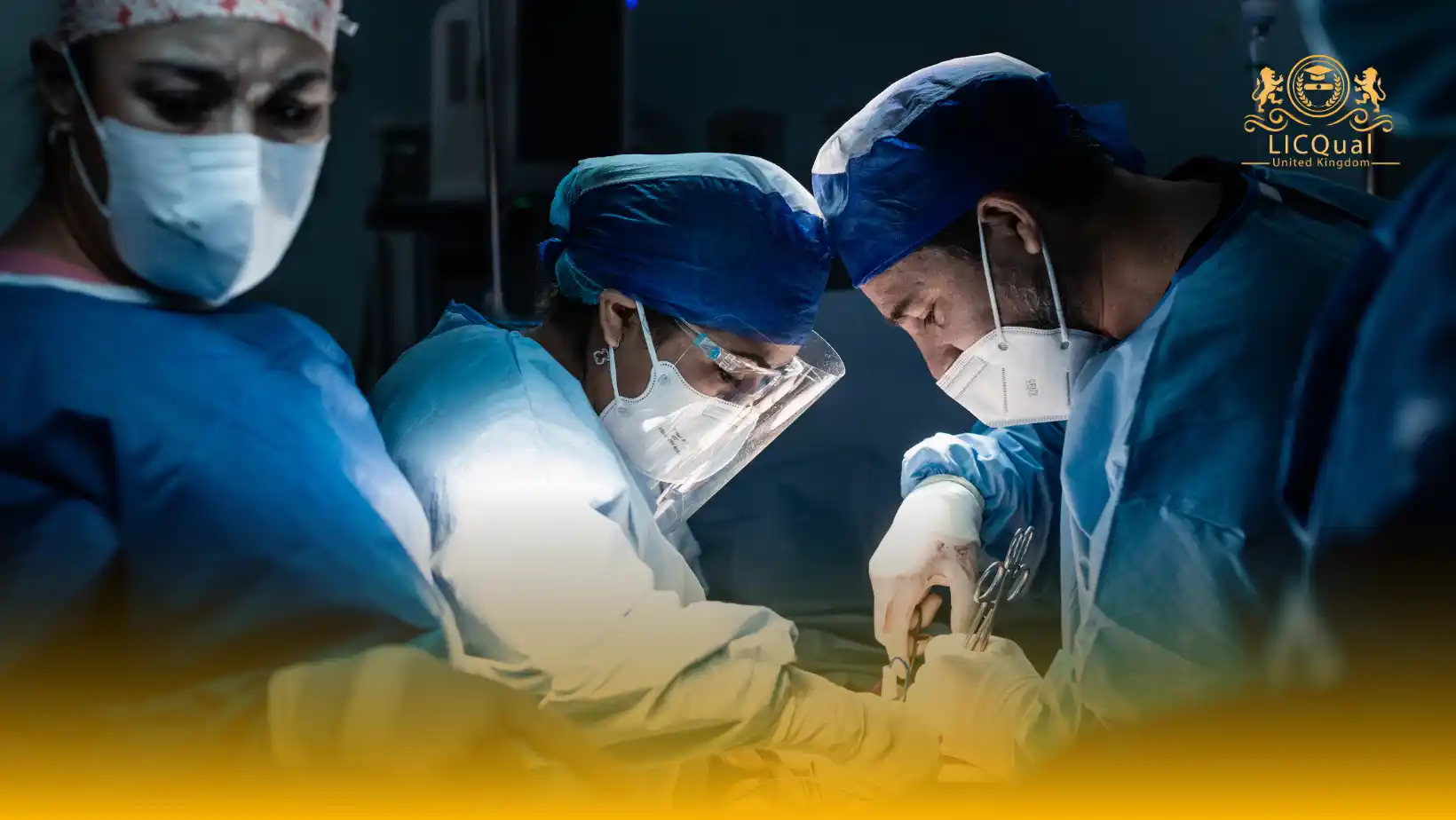The LICQual Level 3 Diploma in Oral and Maxillofacial Surgery is a specialist professional qualification designed for experienced dental and medical practitioners aiming to advance their skills in surgical procedures involving the oral cavity, jaws, and facial structures. This comprehensive programme provides in-depth knowledge and practical expertise in the diagnosis, treatment planning, and surgical management of complex oral and maxillofacial cases.
This qualification is not intended for fresh candidates. It is specifically tailored for professionals with relevant clinical backgrounds who are committed to enhancing their career prospects, expanding their scope of practice, and fulfilling their Continuing Professional Development (CPD) objectives. Through this programme, learners will develop advanced competencies in areas such as trauma management, oral pathology, dentoalveolar surgery, reconstructive techniques, and the application of surgical principles in facial aesthetics.
Centres delivering the LICQual Level 3 Diploma in Oral and Maxillofacial Surgery must have highly qualified and experienced trainers, as well as access to all the necessary surgical instruments, clinical facilities, and learning materials required for effective training delivery. This ensures that learners benefit from high-quality, evidence-based teaching that meets professional standards and supports safe, ethical surgical practice.
By completing this diploma, learners will be equipped with the theoretical understanding and practical abilities to manage a wide range of oral and maxillofacial surgical cases. The programme empowers professionals to deliver advanced patient care, stay aligned with the latest industry developments, and achieve excellence in their surgical practice.
Course Overview
Qualification Title
LICQual Level 3 Diploma in Oral and Maxillofacial Surgery
Total Units
6
Total Credits
60
GLH
240
Qualification #
LICQ2200654
Qualification Specification
To enroll in the LICQual Level 3 Diploma in Oral and Maxillofacial Surgery, applicants must meet the following criteria:
|
Qualification# |
Unit Title |
Credits |
GLH |
|---|---|---|---|
|
LICQ2200654-1 |
Principles and Foundations of Oral and Maxillofacial Surgery |
10 |
40 |
|
LICQ2200654-2 |
Diagnostic Techniques and Treatment Planning in Oral and Maxillofacial Surgery |
10 |
40 |
|
LICQ2200654-3 |
Dentoalveolar and Pre-Prosthetic Surgical Procedures |
10 |
40 |
|
LICQ2200654-4 |
Management of Maxillofacial Trauma and Reconstructive Surgery |
10 |
40 |
|
LICQ2200654-5 |
Oral Pathology and Management of Oral Lesions |
10 |
40 |
|
LICQ2200654-6 |
Post-Operative Care, Complication Management, and Continuing Professional Development |
10 |
40 |
By the end of this course, learners will be able to:
Principles and Foundations of Oral and Maxillofacial Surgery
- Understand the fundamental principles, history, and scope of oral and maxillofacial surgery
- Explain the anatomy, physiology, and pathology relevant to surgical interventions in the oral and maxillofacial region
- Recognize ethical, legal, and professional responsibilities of oral and maxillofacial surgeons
- Demonstrate knowledge of infection control, patient safety, and surgical asepsis
- Evaluate indications and contraindications for common oral surgical procedures
Diagnostic Techniques and Treatment Planning in Oral and Maxillofacial Surgery
- Apply clinical examination methods to identify oral and maxillofacial conditions
- Interpret radiographic and other diagnostic imaging techniques relevant to oral surgery
- Formulate accurate diagnoses based on clinical and diagnostic data
- Develop comprehensive and evidence-based treatment plans
- Evaluate patient risk factors and create strategies for minimizing surgical complications
Dentoalveolar and Pre-Prosthetic Surgical Procedures
- Perform routine dentoalveolar surgical procedures safely and effectively
- Prepare the oral cavity for prosthetic rehabilitation using appropriate surgical techniques
- Manage soft and hard tissue modifications to optimize oral function and aesthetics
- Assess surgical outcomes and make necessary adjustments to ensure successful patient recovery
- Demonstrate competence in using surgical instruments and materials for these procedures
Management of Maxillofacial Trauma and Reconstructive Surgery
- Identify and classify various types of maxillofacial injuries
- Plan and perform emergency and elective management of facial trauma
- Apply reconstructive surgical techniques to restore function and aesthetics
- Integrate multi-disciplinary approaches for complex maxillofacial trauma cases
- Evaluate patient outcomes and implement long-term rehabilitation strategies
Oral Pathology and Management of Oral Lesions
- Identify and classify common oral lesions and pathologies
- Apply appropriate diagnostic and investigative techniques for oral diseases
- Formulate evidence-based management plans for benign and malignant oral conditions
- Recognize systemic conditions with oral manifestations and their clinical implications
- Monitor and follow up patients to ensure effective treatment outcomes
Post-Operative Care, Complication Management, and Continuing Professional Development
- Implement effective post-operative care protocols for oral and maxillofacial surgery patients
- Identify, prevent, and manage common post-surgical complications
- Communicate effectively with patients regarding recovery expectations and care instructions
- Demonstrate reflective practice to improve clinical skills and patient outcomes
- Engage in continuous professional development (CPD) to maintain competence and stay updated with advances in oral and maxillofacial surgery
The LICQual Level 3 Diploma in Oral and Maxillofacial Surgery is designed for dental professionals, surgeons, and allied dental practitioners who want to enhance their surgical skills, manage complex oral and facial cases, and gain internationally recognized certification. This course is ideal for those aiming to advance their careers in oral and maxillofacial surgery while delivering high-quality patient care.
1. General Dentists and Practitioners
- Dentists aiming to expand their surgical expertise in oral procedures.
- Professionals seeking advanced training in tooth extraction and impacted teeth management.
- Clinicians wanting internationally recognized certification in oral surgery.
- Dentists focused on improving patient care and safety during surgical procedures.
- Practitioners interested in incorporating complex maxillofacial treatments into their practice.
2. Oral Surgeons and Specialists
- Oral and maxillofacial surgeons enhancing their procedural skills.
- Specialists managing complex jaw and facial surgeries.
- Surgeons seeking advanced hands-on clinical training.
- Professionals improving precision in corrective jaw and trauma management.
- Experts aiming to stay updated with modern surgical techniques.
3. Dental Hygienists and Assistants
- Hygienists and assistants supporting surgical procedures safely.
- Staff learning proper preoperative and postoperative patient care.
- Professionals assisting in complex oral and facial interventions.
- Team members enhancing workflow efficiency in surgical settings.
- Staff pursuing certification to improve career opportunities in surgery-assisted dentistry.
4. Dental Students and Graduates
- Recent graduates preparing for specialized careers in oral surgery.
- Students seeking hands-on experience with maxillofacial procedures.
- Learners aiming for internationally recognized credentials.
- Individuals building foundational surgical knowledge for future practice.
- Aspiring dental professionals focused on advanced patient care.
5. Academic and Research Professionals
- Educators incorporating oral surgery into dental curricula.
- Researchers studying surgical techniques and patient outcomes.
- Academics developing evidence-based protocols for oral and maxillofacial care.
- Professionals conducting studies on trauma management and surgical interventions.
- Instructors providing practical training for students in oral surgery.
6. Multidisciplinary Healthcare Teams
- Medical professionals collaborating on maxillofacial cases.
- Staff learning to manage complex patient cases efficiently.
- Professionals integrating surgical care with broader dental and medical treatment plans.
- Team members focusing on safety, efficiency, and patient outcomes.
- Practitioners optimizing communication and coordination in surgery.
7. Career-Focused Dental Professionals
- Individuals seeking to enhance surgical and clinical skills.
- Professionals aiming for globally recognized certification in oral surgery.
- Dentists expanding practice offerings with advanced maxillofacial procedures.
- Learners enhancing credibility and professional reputation.
- Dental professionals committed to excellence in patient care and surgical outcomes.
This course equips a wide range of dental and surgical professionals with advanced expertise in oral and maxillofacial surgery, enhancing clinical competence, patient care, and career growth.
To deliver this diploma successfully, training centers should meet the following standards:
- Accredited Training Facility: The center must be licensed and accredited to offer professional dental or surgical courses in compliance with local regulations.
- Qualified Instructors: Trainers should have recognized qualifications in oral and maxillofacial surgery, dentistry, or related medical fields, with relevant clinical experience.
- Clinical Training Resources: Access to dental surgery labs, clinical simulation equipment, and operating rooms for hands-on practice and practical assessments.
- Learning Materials and Resources: Provision of updated textbooks, surgical instruments, case studies, e-learning platforms, and other educational resources to support theoretical and practical learning.
- Health and Safety Compliance: Adherence to infection control protocols, patient safety guidelines, and clinical health regulations for practical training sessions.
- Assessment and Examination Facilities: Availability of secure facilities to conduct practical and written assessments, as well as the ability to track learner progress effectively.
- Student Support Services: Provision of mentoring, guidance, and support to help learners complete the course successfully, including access to career guidance and CPD opportunities.
- Continuing Professional Development (CPD) Integration: The center should facilitate ongoing professional development and encourage learners to stay updated with advances in oral and maxillofacial surgery.
Meeting these requirements ensures the center can provide high-quality, internationally recognized training in oral and maxillofacial surgery.
Assessment and Verification
All units within this qualification are subject to internal assessment by the approved centre and external verification by LICQual. The qualification follows a criterion-referenced assessment approach, ensuring that learners meet all specified learning outcomes.
To achieve a ‘Pass’ in any unit, learners must provide valid, sufficient, and authentic evidence demonstrating their attainment of all learning outcomes and compliance with the prescribed assessment criteria. The Assessor is responsible for evaluating the evidence and determining whether the learner has successfully met the required standards.
Assessors must maintain a clear and comprehensive audit trail, documenting the basis for their assessment decisions to ensure transparency, consistency, and compliance with quality assurance requirements.







